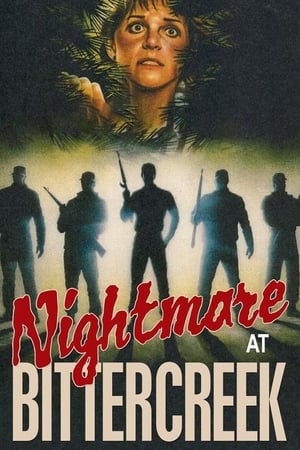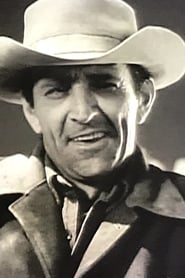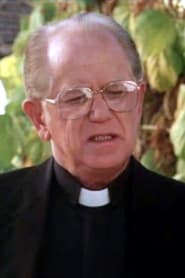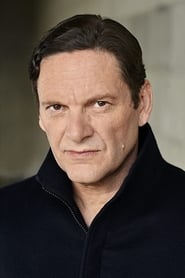Cast
View AllLindsay Wagner
as Nita Daniels
Tom Skerritt
as Ding
Constance McCashin
as Connie Senia
Joanna Cassidy
as Allison Shapiro
Janne Mortil
as Tracy Senia
Raymond Guth
as Gil Proctor
Dwight McFee
as Bully
J.C. Roberts
as Sheriff
Walter Marsh
as Coroner
Ric Reid
as Jack
Bruce MacLeod
as FBI Agent
Bill Croft
as Suspect
Jennifer Griffen
as Waitress
Andrew Kavadas
as Cop
Roman Podhora
as Billy
Crew
Director
- Tim Burstall
Writer
- Scott Swanton
- Greg McCarty
Producer
- Scott Swanton
Reviews
Wuchak
***When you're forced to Kill to survive***
RELEASED TO TV IN 1988 and directed by Tim Burstall, "Nightmare at Bittercreek" stars Tom Skerritt as Ding, an alcoholic trail guide who leads four vacationing women on horseback in the Sierra Nevada Mountains. They unwittingly stumble across a ruthless group of paramilitary Neo-Nazis and engage in a deadly game of cat & mouse in the rugged wilderness. Will they make it out alive? The women are played by Lindsay Wagner, Constance McCashin, Joanna Cassidy and teenaged Janne Mortil.
The DVD cover curiously mis-advertises the movie with images of the KKK, the Confederate flag, a noose and a grizzly bear. NONE of these items are in the movie; the story takes place in the mountains of Northern California, not in the South. This is a dead serious adventure film and, despite the inherent limitations of its TV budget, as well as lame clichés and dated score, is one of the best survival movies I've ever seen.
If you favor films like "The Edge" (1997), "Deliverance" (1972) and "First Blood" (1982) then you'll appreciate "Nightmare at Bittercreek." In terms of technical production it's by far the least of these because it's a TV flick, but in spirit it's nearly as good in its own way and arguably on par. It's similar to the TV movie "Relentless" (1977) with Will Sampson, but significantly more compelling.
Except for the opening in town, practically the entire movie takes place in the rugged high country with magnificent sylvan sceneries, including awesome waterfalls. In addition, the human interest is strong, as the story makes you care for the disillusioned cowboy, the four women and Buster, the guide's dog.
The guerillas are wisely depicted in a vague manner, camouflaged silhouettes in the forestry or malevolent voices on a walkie-talkie. There are scenes of quality suspense and nigh horror, all grounded in reality (except for, like I said, a couple of eye-rolling clichés). For instance, a rivalry with another trail guide (Dwight McFee) is revealed at the beginning, which leads to a tense and believable confrontation, not to mention a knockdown-drag-out brouhaha. The sequence is expertly done and smacks of real life.
I can only attribute the low reviews to nitpicky film snobs who get off on panning low-budget productions. The fools.
THE MOVIE RUNS 92 minutes and was shot in the North Vancouver area. WRITERS: Scott Swanton & Greg McCarty.
GRADE: B+/A-
Dec 26, 2019
Thematic Analysis
This high-octane TV Movie/Action/Thriller film balances spectacular sequences with character-driven moments. Unlike many films in the genre, Nightmare at Bittercreek distinguishes itself through a unique visual style and creative action choreography.
Director Tim Burstall brings their distinctive visual style to this film, continuing their exploration of themes seen in their previous works while adding new elements. Their approach to pacing and visual storytelling creates a viewing experience that rewards close attention.
Released in 1988, the film exists within a cultural context that now offers viewers historical perspective on the social issues of that era. Its reception demonstrates the diverse reactions to its artistic choices and its place in cinema history.
Did You Know?
- The production of Nightmare at Bittercreek took approximately 32 months from pre-production to final cut.
- The final cut of the film runs for 100 minutes, though the director's initial assembly was reportedly 134 minutes long.
- Some visual effects sequences took up to 3 months to complete.
- The screenplay went through 14 major revisions before the final shooting script was approved.
- The cast underwent specialized training for 6 weeks before filming began.
Historical Context
- In 1988, when this film was released:
- Personal computers were beginning to transform homes and workplaces.
- The Cold War was entering its final phase.
- Independent cinema was growing in influence, challenging the dominance of major studios.
How This Film Stands Out
Details
- Release Date: May 24, 1988
- Runtime: 1h 40m













